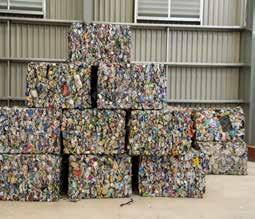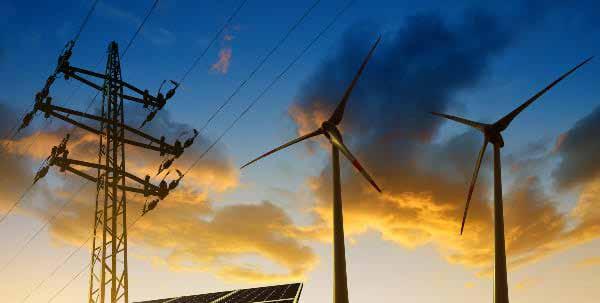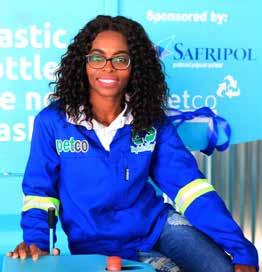
5 minute read
News round-up
by 3S Media
SUSTAINABILITY NEWS FROM AROUND THE WORLD
Aluminium among the materials most recycled
Advertisement
The International Aluminium Institute (IAI) has released global aluminium recycling data. According to figures from the IAI, recycling just one aluminium can conserves enough energy to recharge up to 20 mobile phones, while global aluminium recycling saves enough energy every year to power the whole of France.
Commenting on the recycling data, Marlen Bertram, director: Product Stewardship at the IAI, said: “Aluminium is one of the most recycled materials on earth. Today, the global recycling efficiency rate is 76%. High recycling rates in all regions underline the economic and environmental value of aluminium scrap.”
According to the IAI, every year, more than 30 million tonnes of aluminium scrap is recycled globally, ensuring its status as one of the most recycled materials on the planet. Aluminium can be remelted and reused without any impact on its unique properties. This means that aluminium products can be recycled repeatedly. Almost 75% of the 1.5 billion tonnes of aluminium ever produced is still in use today.
How Covid-19 impacted the waste sector and its workforce
Businesses across the globe were forced to re-evaluate their approach to cleaning and hygiene regimes, especially their waste management protocols, due to the Covid-19 pandemic. These changes will undoubtedly continue through 2021.
One of the most interesting developments in major companies was the approach to including their new cleaning and waste management protocols into their communication strategies and incorporating these into their brand messaging. Waste generators also have legal responsibility, according to the National Environmental Management: Waste Act (No. 59 of 2008), to take all appropriate steps to manage waste.
Before the Covid-19 pandemic, there were standard health and safety policies and protocols in place, but these were simply not enough. Specific measures were implemented, including the revision of and training on stricter waste handling procedures, ensuring consistent supply of PPE, clocking stations upgraded to no-touch facial recognition biometrics, temperature testing, and self-declarations (including co-morbidities) of all people who enter the sites.
“To ensure the health and safety of everyone within the waste management value chain – as well as of the population at large – companies should contract providers with the expertise and compliance to safely manage waste while limiting harm to their employees,” says Brindha Roberts, head: Sustainability at Averda.


Waste management companies urged to help limit landfill fires
Fires at landfill sites happen more often than one would expect. There are several contributing factors that can lead to fires; however, whether as a result of arson or the exposure of materials on-site, the huge potential impact can largely be avoided with the implementation of adequate preventative measures.
The effects of incorrectly handled fires are not limited to health and the environment but impact on society and business too. In some cases, nearby highways, schools and businesses have had to close. But on an effectively managed landfill, a fire will be controlled quickly, and limited damage suffered. There are clear regulations in place that determine the preventative measures that have to be in place – especially when it comes to the potential danger of landfill fires.
A well-run site will ensure that daily cover-up is done, to ensure that no refuse is left exposed to the elements and to the potential risk of fire or combustion. Sites should also have trained firefighters as part of their teams to ensure a quick, on-site response.
“My recommendation is for everyone to become familiar with these regulations. If you are sending any waste to a landfill site, make sure the site is properly managed and regularly audited. We all have a part to play in preventing landfill fires,” says Reg Gerber, national landfill manager at Averda’s Vlakfontein site.
FOOD WASTE INITIATIVE AIMS FOR A MORE SUSTAINABLE PLANET

According to the World Wildlife Fund (WWF), 10 million tonnes of food ends up as waste in South Africa, which is about a third of the 31 million tonnes produced annually in the country. Of this wasted food, about 90% is disposed of at landfills, where it leads to the production of greenhouse gases like methane gas and carbon dioxide.
By cutting down on food waste, we not only decrease carbon emissions but significantly turn around the food insecurity felt by many South Africans.
The 10x20x30 Food Waste Reduction Initiative is an initiative by local supermarket chain giant Pick n Pay. It has asked 20 of its biggest suppliers to join the company in its global food waste reduction initiative.
The project is backed by 10 of the world’s largest food retailers and manufacturers, and will focus on in-store and supply chain food loss and waste. Partnerships and collaborative action are key factors Pick n Pay asserts will help to address food waste in value chains.

SA recovered 1.2 million tonnes of recyclable paper products in 2019

A Mpumalanga recycling project has received acclaim for improving the lives and livelihoods of Ermelo community members while making a positive difference to the environment. Johanna Leshabane launched Bophelo Recycling in 2007 after being retrenched. Today, with 11 full-time staff and 20 part-time waste pickers, the waste buy-back centre collects 36 t of recyclable PET plastic from informal settlements, households and schools in the Ermelo area.
This equates to a 79% increase in total collection volumes since inception. Bophelo Recycling has helped stimulate job creation, economic growth and development in the area, and, as a result, has received national acclaim. This recognition, in the form of the Responsible Care Initiative Award in the Corporate Social Responsibility category, comes from the Chemical and Allied Industries Association, which acknowledged the impact the project has made on improving the lives and livelihoods of Ermelo community members while making a positive difference to the environment.

Joining forces to develop renewables in sub-Saharan Africa
Enel Green Power signed an agreement with a subsidiary of Qatar Investment Authority (QIA) for a joint venture partnership aimed at financing, building and operating renewable projects in subSaharan Africa.
The parties also signed an agreement whereby QIA will acquire 50% of EGP’s stake in projects in operation and under construction in South Africa and Zambia of approximately 800 MW capacity.
Through this new partnership, Enel will combine its group’s sustainable strategy and enhanced expertise in business development, engineering and construction, as well as operation and maintenance of renewable plants, with QIA’s long-term investment strategy, in line with the two companies’ sustainability and decarbonisation targets.
They will work together to accelerate the creation of an extensive green energy footprint in sub-Saharan Africa, contributing to the continued pursuit of its ambitious goals in this sector by further harnessing the region’s immense renewable potential and contributing to a more sustainable economic development model in this part of the world.










